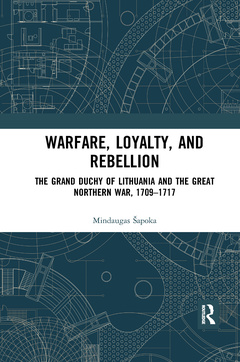Description
Warfare, Loyalty, and Rebellion
The Grand Duchy of Lithuania and the Great Northern War, 1709–1717
Author: Šapoka Mindaugas
Language: English
Subject for Warfare, Loyalty, and Rebellion:
Keywords
Lithuanian Army; Kazimierz Sapieha; Silent Sejm; Jan Sapieha; Neuburg Estates; Sandomierz Confederates; Ludwik Pociej; Sandomierz Confederation; Relational Sejmiks; Saxon Troops; Middling Nobility; Grand Hetmans; Senatus Consilium; Saxon Contribution; Fiscal Tribunal; Lithuanian Sejmiks; Jan Szembek; Polish Lithuanian Armies; Swedish Adherents; Lithuanian Szlachta; Vilnius Confederation; Augustus III; Ducal Prussia; Great Northern War; Petty Nobility
Publication date: 06-2020
· 15.2x22.9 cm · Paperback
Publication date: 09-2017
· 15.6x23.4 cm · Hardback
Description
/li>Contents
/li>Biography
/li>
This book examines the politics of the Grand Duchy of Lithuania during the crucial period between the Russian tsar Peter the Great?s victory over Sweden at the battle of Poltava and the 1717 Silent Sejm, the Polish-Lithuanian parliament?s session which is traditionally seen as responsible for opening the way to Russian domination of Polish-Lithuanian politics. It not only challenges the accepted view of the passivity of the Lithuanian gentry and their subservience to the Russians, but also presents a clear view of how the Lithuanian economy and political system were functioning in 1710?1717, factors which have never been studied in depth in any language. Šapoka argues that much more blame for the Confederations of Vilnius and Tarnogród that had led to the Silent Sejm can be attributed to the Polish king Augustus II than is argued by the conventional scholarship. By so completely and deliberately ignoring the Commonwealth?s institutions and refusing to work within them, the Polish king provoked justified suspicion that by destroying the basis of the consensual political system, he wanted to introduce absolute monarchy.
Introduction Part I: Warfare 1. The Council of Warsaw 2. Efforts to Continue the War 3. The Lithuanian Budget 4. Local Politics Part II: Between Loyalty and Rebellion 5. Russian Influence 6. The Internal Struggles 7. Fatal Decision Part III: Rebellion 8. The Confederation of Vilnius 9. Nationwide Uprising 10. Constructing the Peace Agreement. Conclusions
Mindaugas Šapoka was educated at Vilnius University and the University of Aberdeen, where he wrote his doctorate under the supervision of Professors Robert Frost and Karin Friedrich. In 2015 he was awarded a one-year Junior Research Fellowship by the Institute of Historical Research at the University of London to research Jacobite connections with the Sobieski family.




